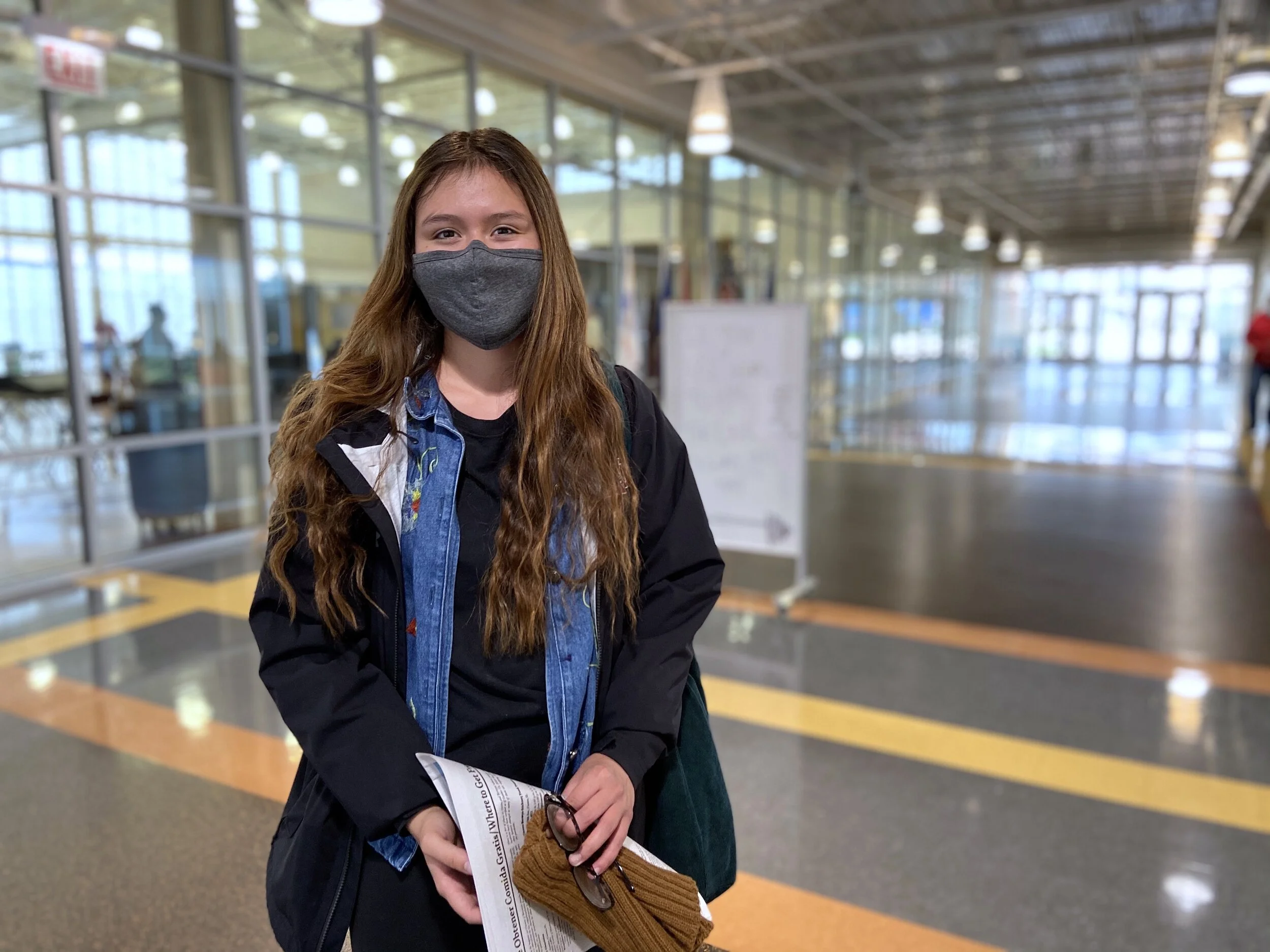With Federal Elections Over, Cicero Residents Address Barriers to Participating in Local Elections
Voters in Cicero come out to vote at Morton Freshman Center, one of the many polling locations, on Election Day on November 3rd, 2020 for the Presidential Elections. (Photo by Jesus J. Montero)
By Luis Velazquez
Early next year, voters in Cicero and Berwyn will have the opportunity to elect a new town president, or mayor in the case of Berwyn, school board members and other officials who will be running for office.
Now that the federal elections are over, Cicero and Berwyn residents will switch gears and focus on important local races. Many say, however, that there are a number of challenges that prevent people from voting during local elections.
Local town elections, also known as the consolidated elections, happen in February and April following the year after the presidential elections.
Brenda Bedolla, union leader and undocumented resident from Cicero, said Cicero’s voter turnout has historically been low. She blames barriers created by the way the system is structured.
“What we’ve seen happen over the years is that instead of creating a participatory process for community members to be involved. It's more like a top down thing where people are being told what to vote for and are not provided with any information to make an informed decision,” Bedolla said.
Bedolla said she believes there is a difference between simply voting and voting in an informed manner. She said elected officials already in power may not always have residents’ interests in mind.
“It's like people are voting the way they are voting because they're told to vote that way by people who are in power. We already know that the people that are in power want to elect people that are going to serve their self interest,” Bedolla said.
Manny Piña, Cicero college student, said their peers have experienced voter intimidation tactics in the past.
“[Figures of authority] should be reprimanded for that because that's putting pressure on Cicero residents to reflect a certain vote,” Piña said.
Other Cicero residents who were interviewed by Cicero Independiente believe there are other factors that create barriers for residents to be involved with local elections.
Fernando Lopez-Flores, college student and Cicero resident, said the town government could do more to inform local elections.
“One problem I think is trying to get the word out or educating the people when the voting is. Like right now I completely forgot when it was. I don't really see any frequent communications on when the ballot is,” Lopez-Flores said. “Sometimes the people you're supposed to vote for here in Cicero, you don't know anything about them. It's the lack of awareness or communication from the town. I think that's the biggest problem.”
Avigail Bailon, college student and frequent voter, also said there is a language barrier when it comes to Cicero elections. Bailon said Cicero candidates don't reach out to Latinx or Spanish speaking members of the community.
“[Offering] more Spanish resources, literature, communication for community members and reaching out. I think providing the resources to know who the candidates are and what they believe in English and Spanish is the most important thing that you can do,” Bailon said.
Morad Misleh, Cicero resident and voter, said there should be more interpreters in polling sites.
“My mom doesn't speak or read English, but when I take her to vote I'm able to translate it for her. The election officials understand that. They can't necessarily object to that because there are no rules. There are no literacy poles or anything anymore,” Misleh said.
Esteban Rodriguez, Cicero resident, said he believes that when it comes to local elections, the lack of challengers in Cicero has been the biggest issue for decades.
“That plays a huge component, that they are running unopposed. What that means is that the current administration now is not going to have a challenger and that gives them an automatic victory,” Rodriguez explained.
Louri Fuentes, Cicero resident and mother, said the lack of opponents influences a resident's decision. She also thinks the governing boards should better reflect the town’s racial demographics. From experience, Fuentes said a lot of people believe that Larry Dominick will possibly win again.
“It's the mentality that needs to change, which is kind of hard,” Fuentes said. “If they don't see a lot of diversity inside whoever is running or in the board of trustees, they need to have more people that are more diverse on their governing board.”
Misleh said he believes too many of the same people are on the different boards or are even each other’s family members.
“I feel like from personal experience and stuff that I've seen, I think the town could be a little better run,” Misleh said. “I just feel like if you're going to run a town, you need to have a diverse cast of individuals.”
Cicero Independiente has partnered with WBEZ to create materials to help readers be informed about local elections. We want to hear from you. Help us by taking this survey: https://www.surveymonkey.com/r/3FD5NP9?A=Partners
Luis Velazquez is a reporter for Cicero Independiente and is currently a student at the University of Illinois at Urbana-Champaign.


![Caption description: “Many [Cicero residents] are undocumented so that's always going to be like a big set back. Not only that but a lot of people like myself are uneducated in that arena so when the time comes [for local elections] we are clu…](https://images.squarespace-cdn.com/content/v1/5d198eaea368080001cc6011/1605222752908-330UTRDS9FSKDI7HGMWB/2.png)











